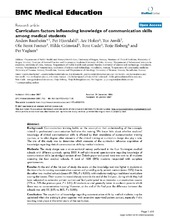Curriculum factors influencing knowledge of communication skills among medical students
Bærheim, Anders; Hjortdahl, Per; Holen, Are; Anvik, Tor; Fasmer, Ole Bernt; Grimstad, Hilde; Gude, Tore; Risberg, Terje; Vaglum, Per
Peer reviewed, Journal article
Permanent lenke
https://hdl.handle.net/1956/2667Utgivelsesdato
2007-10-10Metadata
Vis full innførselSamlinger
Originalversjon
https://doi.org/10.1186/1472-6920-7-35Sammendrag
Background: Communication training builds on the assumption that understanding of the concepts related to professional communication facilitates the training. We know little about whether students' knowledge of clinical communication skills is affected by their attendance of communication training courses, or to what degree other elements of the clinical training or curriculum design also play a role. The aim of this study was to determine which elements of the curriculum influence acquisition of knowledge regarding clinical communication skills by medical students. Methods: The study design was a cross-sectional survey performed in the four Norwegian medical schools with different curricula, spring 2003. A self-administered questionnaire regarding knowledge of communication skills (an abridged version of van Dalen's paper-and-pencil test) was sent to all students attending the four medical schools. A total of 1801 (59%) students responded with complete questionnaires. Results: At the end of the 1st year of study, the score on the knowledge test was higher in students at the two schools running communication courses and providing early patient contact (mean 81%) than in the other two medical schools (mean 69–75%, P ≤ 0.001), with students studying a traditional curriculum scoring the lowest. Their scores increased sharply towards the end of the 3rd year, during which they had been subjected to extensive patient contact and had participated in an intensive communication course (77% vs. 72% the previous year, P ≤ 0.01). All students scored generally lower in academic years in which there was no communication training. However, at the end of the final year the difference between the schools was only 5% (81% vs. 86%, P ≤ 0.001). Conclusion: The acquisition of knowledge regarding communication skills by medical students may be optimised when the training is given together with extensive supervised patient contact, especially if this teaching takes place in the initial years of the curriculum.
